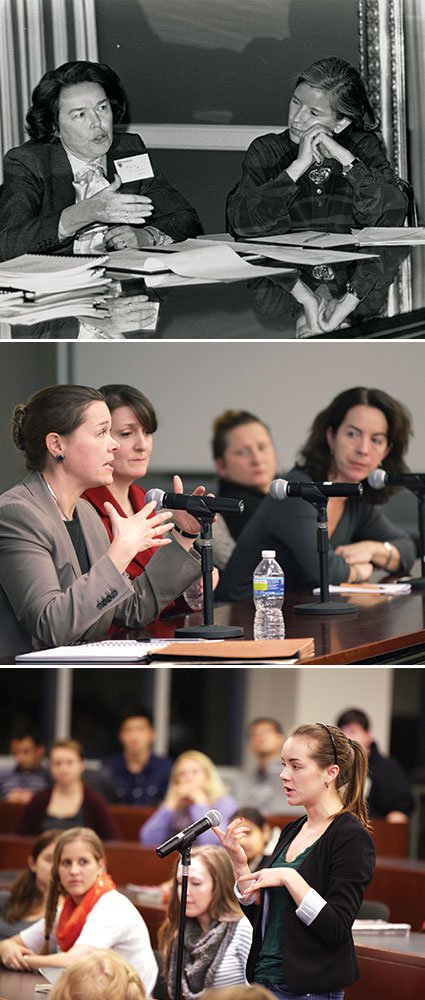
In fall 1971, an innocuous student newspaper announcement of the formation of a new student club, the Women Law Students Association, “prompted a spate of contentious articles and letters from students and recent alumni,” Don Welch relates in Vanderbilt Law School: Aspirations & Realities, his history of Vanderbilt Law School (Vanderbilt University Press, 2008). One missive, from a group calling itself the “Vanderbilt Association of Male Chauvinist Pigs,” sarcastically inquired whether the paper had indulged in “good satire or outright slander.”
If any “Pigs” were still in law school by 1973, they would have experienced a clear indication of changing times. When the number of women students increased from 14 in 1970 to 62 in 1973, the law school’s single, one-stall women’s restroom—shared by female students and the law school’s single female faculty member, Martha Craig (Cissy) Daughtrey ’68, now a senior judge on the Sixth Circuit Court of Appeals—became woefully inadequate. Aleta Trauger ’76 (MAT’72), now a federal judge for the Middle District of Tennessee, and other first-year students asked Dean John Wade to designate another women’s facility. Wade’s solution—a staff restroom in a distant corner of the building—was unsatisfactory.
After two uncomfortable months spent traipsing to the far ends of the law school to answer inconvenient calls of nature, Trauger and other WLSA members took action: They pasted a “women’s” sign on the door of the law school’s most centrally located men’s room and began using it.
A two-week turf battle ensued, during which students of both genders used the facility before Wade formally conceded it to the women. “I think they even put ferns in the urinals,” Daughtrey chuckled. She was WLSA’s first faculty advisor by virtue of being the first woman appointed as full-time faculty in 1972. “When I started teaching there were 12 women and when I left (in 1975), there were 112,” Daughtrey said.
Trauger recalls writing bylaws for WLSA with Jeanie Nelson ’75 (BA ’69). “Of course, every woman at the law school was in it,” Trauger said. She formed a study group with fellow WLSA members Marnie Huff, Susan McGannon and Mary Jo Middlebrooks. By 1976, when the four women graduated, almost a third of Vanderbilt’s students were women, and Chancellor Alexander Heard was praising WLSA for its contributions to the school’s intellectual life. WLSA had not only sponsored a well-attended Southeastern Regional Conference on Women and the Law that year, but also published a booklet, Tennessee Women in the Law, that sold more than 2,000 copies.
Today WLSA sponsors speakers, events and volunteer opportunities throughout the year, including a major panel discussion each year focusing on women’s issues. The 2013 panel, “Sex Sells: The Commercialization of Women’s Bodies,” featured Martina Vandenberg of the Human Trafficking Pro Bono Legal Center, Antoinette Welch of the Davidson County District Attorney’s office and Cary Rayson of Magdalene House, a residential program for former prostitutes. WLSA members can also participate in mentoring program with the Nashville Lawyer’s Association for Women, an organization founded by first-generation WLSA members. “My first year, I took the general advice to sign up for everything then whittle down from there,” said Holly Rhea ’14, who headed WLSA’s mentoring program this year. “I stuck with WLSA.”